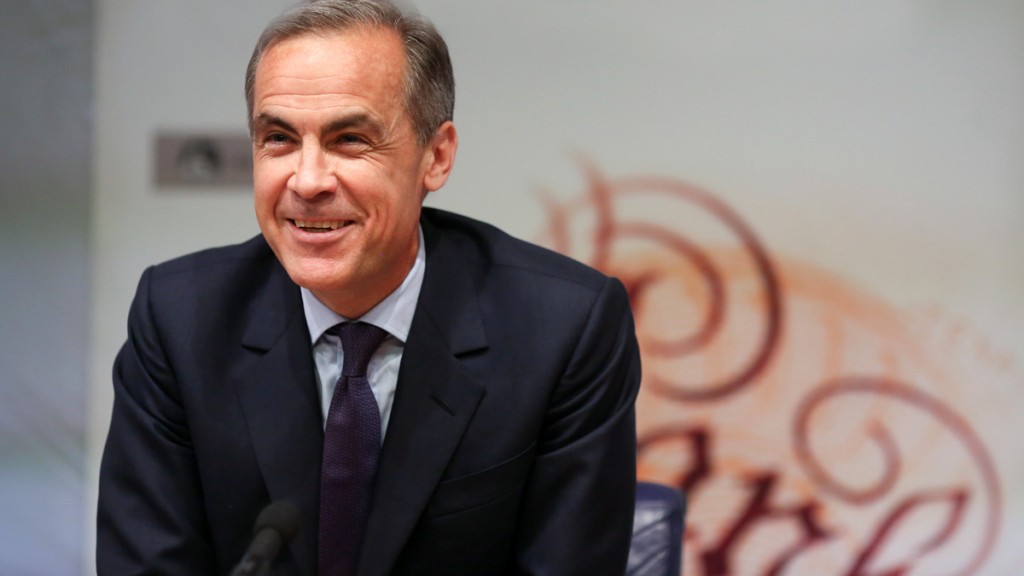
Since the EU referendum result, the pound has fallen. But a weaker currency is exactly what the Bank of England wants, says John Stepek. Here’s why.
There’s not a central banker in the world who wants a strong currency at the moment.
The US Federal Reserve has held off raising rates because it doesn’t want to see the dollar any stronger. The Chinese want the renminbi to devalue (and they’re quietly, gradually managing it).
The Bank of Japan is looking in despair at the strengthening yen. The European Central Bank is crossing its fingers and hoping that the euro won’t rally.
But one man’s absolutely laughing.
Mark Carney, governor of the Bank of England…
Carney: oops, I did it again
The pound had a bit of a bounce yesterday, on the news that Boris Johnson had decided not to run for UK prime minister after all.
You could argue that it’s because this increases the chances of someone fairly neutral on Brexit, like Theresa May, becoming prime minister. That in turn increases the chances that Brexit will look a lot like remaining in the EU.
Alternatively, you could argue that it was just part of the ongoing process of markets getting a grip on reality again after the shock to the system seen last Friday.
Whatever the reason, sterling was on the rise. And then Mark Carney, central bank boss and custodian of the nation’s currency, kicked the legs out from under it.
Carney gave a speech yesterday afternoon. His basic point was as follows. The UK has made a leap in the dark. There will probably be a recession. In fact, Britain is already suffering from “economic post-traumatic stress disorder”.
I can’t fix this, he said – it’s up to politicians to do so. “There are limits to what the Bank of England can do. In particular, monetary policy cannot immediately or fully offset the economic implications of a large, negative shock.”
But, he added, he will try to make the monetary policy backdrop as forgiving as possible in the meantime. He said that he reckons there’ll be justification for lowering interest rates over the summer months.
That’s all it took. Sterling fell by more than 1% against the dollar, down to $1.32. Meanwhile, gilts fell into negative territory. It’ll now cost you a fraction of a fraction of a percent to lend money to the UK government over two years. (And on that point, nearly $12trn in global government bonds now offer negative yields – astounding).
A weaker currency is exactly what Mark Carney wants
Wow. The UK government can now charge you in order to look after your money. Brexit has supercharged the bond bubble and made Britain even more of a safe haven than it was deemed before.
That’s odd, isn’t it? Bear in mind that one of the epic scare stories from before the Brexit vote was the idea that the Bank of England would be forced to raise interest rates and thus borrowing costs, even in the face of a recession, in order to defend the pound and prevent capital flight.
But as it turns out, the Bank of England governor can’t talk the currency down fast enough.
Make no mistake, Carney would have been well aware of the impact of his decision. The pound went down because he wants it to go down – if he didn’t want it to fall, he’d have made a different speech.
A weaker currency translates into looser monetary policy. It draws trade and investment from other countries. As Ambrose Evans-Pritchard notes in The Daily Telegraph, it’s “a shock absorber”, just as it was “in 1931, 1992, and 2008, all bigger falls, and all benign”.
(It also appears to have triggered bargain hunting from anyone rich with a dollar-linked currency burning a hole in a back pocket. A Sotheby’s art auction this week raised more than expected, reports the Financial Times, with “international investors… swooping in” to exploit the “ridiculous opportunity” created by Brexit, according to Philip Hoffman of art investment adviser Fine Art Group. Fine wine merchants have also reported soaring sales to Asian buyers.)
As Evans-Pritchard continues: “Every major country is trying to push down its currency to break out of the [deflation] trap, and largely failing to do so.” Britain didn’t deliberately vote Brexit to drive down sterling – but we have “stolen a march of sorts, carrying out a beggar-thy-neighbour devaluation by accident”.
It’s ironic. It’s probably not what Mark Carney wanted. And I’m not sure his task will be that easy. I suspect that the pound’s preferred “natural” direction at the moment would actually be flat to higher. And other central banks are unlikely to tolerate Britain hanging on to the much-coveted currency wooden spoon for long.
But for now, I reckon Carney will make damn sure that he takes advantage of the stupendous excuse he now has to talk the pound down without fear of being taken to task by his peers in other countries.